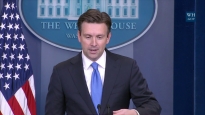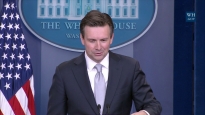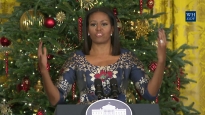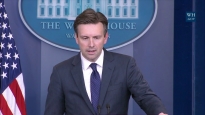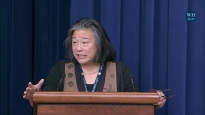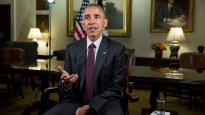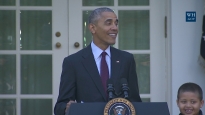Press Briefing
August 13, 2014 | 41:55 | Public Domain
Press Filing Center
Edgartown, Massachusetts
Press Briefing by Principal Deputy Press Secretary Eric Schultz and Deputy National Security Advisor Ben Rhodes, 8/13/2014
Press Filing Center
Edgartown, Massachusetts
**Please see below for a correction marked with an asterisk.
12:00 P.M. EDT
MR. SCHULTZ: Good morning. I apologize for the weather, but we’ll try and make it up to you here. I’m going to let Deputy National Security Advisor Ben Rhodes lead us off. He’s got about 10, 15 minutes. He can handle sort of the nitty-gritty on the foreign policy pieces, and then I’ll flesh everything else out.
Ben.
MR. RHODES: Great. Thanks, everybody. Let me just begin by giving you an update on the President’s morning. He was briefed again by National Security Advisor Susan Rice. He did a phone call with Prime Minister Netanyahu of Israel. We’ll have a fuller readout of that call, as it just recently completed. They obviously were focused on the ongoing efforts to get a sustainable cease-fire in place with respect to Gaza.
With that, I’m happy to take questions. Julie.
Q Hey, Ben. Can you update us on the President’s thinking in terms of using U.S. troops to do some kind of rescue mission at Sinjar Mountain? And even though that wouldn’t be combat troops on the ground in a traditional sense, wouldn’t that put Americans at risk in a similar way?
MR. RHODES: Well, again, first of all, we have a very specific objective with respect to the humanitarian situation, and that is to get food, water and emergency supplies to the population on this mountain, and also, as necessary, to take airstrikes against ISIL as they threaten the people on that mountain. And to date, I believe we’ve taken in the range of seven airstrikes associated with that mission.
At the same time, there needs to be a lasting solution that gets that population to a safe space where they can receive more permanent assistance. So what the President has done is authorized the deployment of 130, roughly, U.S. military personnel who will assess the situation on Sinjar Mountain and in northern Iraq. They then, again, will make recommendations about how to follow through on an effort to get the people off that mountain into a safe place. And you heard Prime Minister Cameron indicate today they’re cooperating with us in those efforts as well.
Again, these 130 personnel are not going to be in a combat role in Iraq. They’re there on a temporary basis to make assessments about how to get the population off that mountain. This would be a humanitarian effort to get them to a safe space. There are a range of ways for doing that. We haven’t made decisions about how to carry out that mission because we want to get the readout from this assessment team first.
Q But given that it’s a pretty urgent situation, how quickly do you expect the President to get recommendations from this team?
MR. RHODES: I think relatively quickly here -- in a matter of days. We don’t believe it’s sustainable to just have permanent airdrops to this population on the mountain. Some of them have been able to escape. But again, we want to get options in place and move them to a safer place. There are a range of ways for doing that. Again, we’re going to be cooperating with Kurdish forces who are also operating in the region, other international partners. And our goal here is to work with the Iraqis and with international partners so that these people can get off that mountain to a safer place. Again, we don’t believe that that involves U.S. troops reentering a combat role in Iraq. It involves, frankly, a very difficult logistical challenge of moving folks who are in danger on that mountain to a safer position.
Q But there would be some danger to U.S. personnel that would be involved in a mission like that.
MR. RHODES: Well, look, if at any time you have -- I mean, even now, as we speak, we have pilots flying over Iraq; that always carries with it danger. So in any effort, there are always dangers involved. I think the key point here is that the U.S. forces -- the role of U.S. forces is not one of reentering combat on the ground, it’s how to provide humanitarian assistance to this affected population. And again, in terms of the kinetic actions that are being taken, those are in the form of airstrikes.
Jim.
Q But, Ben, if they come under fire, if that kind of mission is launched and they come under fire, they would be in combat, would they not?
MR. RHODES: Well, look, as a bottom line, force protection is always a mission for U.S. personnel in any country in the world. We’ve already reinforced our embassy in Baghdad and our facility in Erbil with military personnel who are there for the express purpose of protecting those facilities. So any U.S. military personnel anywhere in the world has the ability to protect themselves, but the purpose and the mission that they are going to Iraq for is not to engage in combat. This is to make an assessment on a temporary basis about how we move that population off the mountain and into a safe place.
Q And what do you make of some of the assessments you’ve heard from some of your Republican critics in the last couple days that ISIS does pose a national security threat to the United States? Is that also the opinion of the President, the White House?
MR. RHODES: Well, look, the President has ordered this military action in Iraq because of the threat that they pose to our facility and our people in Erbil. So, by definition, we absolutely believe that ISIL poses a threat to U.S. persons and U.S. personnel. We’re focused on dealing with that threat right now in Iraq so that the terrorists cannot advance on Erbil. The airstrikes that we have launched have stopped those advances and given space for the Kurdish forces, the Peshmerga, to engage ISIL. But we are always monitoring not just the security of our facilities and our people in places like Baghdad and Erbil -- also monitoring potential plots against the United States, and we’ll continue to do that.
Jon.
Q Is one of the options under consideration is creating a safe corridor for the refugees to get off that mountain?
MR. RHODES: Yes, there are a range of options. I don’t want to get ahead of decisions that haven’t been made yet. We’re going to rely on what the teams report back in terms of their assessment. But you look at corridors, you look at airlifts, you look at different ways to move people who are in a very dangerous place on that mountain to a safer position. And that’s exactly what our team is doing on the ground now in Iraq.
Q And is the President willing -- I know he said over and over again no ground troops in Iraq. But is he willing to consider the option of sending a certain number of troops in there for the purposes of establishing something like a force protection, like you’re saying, or a safe corridor for them to get out?
MR. RHODES: Well, we haven’t made that decision at this point, Jon. We want to see what the circumstances are, see what options are available for moving those people who are trapped on the mountain. We obviously have not just U.S. personnel who could potentially get engaged in that type of effort. We have Kurdish forces who are engaged in the area with ISIL. We have international partners who also want to support the provision of humanitarian assistance. So we’ll look at what the best way and the safest way is to get those people off that mountain. And the President will be making decisions after he hears back from the military about what they found on the ground there in Iraq.
Q Just to clarify what I’m asking -- because the President has said over and over again no combat troops, no ground troops in Iraq. Does that statement extend to the idea of a safe corridor -- establishing a safe corridor? Is he willing -- is that something -- so in other words, are you saying -- I think what you’re saying is the President hasn’t ruled out sending in additional troops to establish a safe corridor for those refugees to get off that mountain.
MR. RHODES: Well, again, he hasn’t received a recommendation to establish a corridor at this point.
Q I’m asking what he’s ruled out. Because he’s ruled out many time ground troops.
MR. RHODES: What he’s ruled out is reintroducing U.S. forces into combat, on the ground, in Iraq. But there are a variety of ways in which we can support the safe removal of those people from the mountain. And frankly, we already have people on the ground working with Kurdish forces in a joint operation center in Erbil. So there are ways in which we can coordinate with Iraqi forces on the ground, for instance, in seeking to combat the threat from ISIL and to bring people to a safe space.
But again, as we make decisions about what the best course of action is to bring those people to safety, we will be very transparent about that. I think the principle holds that we’re not putting ground forces in a combat role in Iraq. We’re using U.S. military personnel to assess what the best way is to bring people to safety and what the best way is to provide them with humanitarian assistance. But again, always, force protection is a mission for U.S. personnel wherever they are in the world. That’s certainly true of the reinforcements that are protecting our facilities in Erbil and Baghdad.
Q What information does the U.S. have about how many people still are stranded on the mountain and where exactly they are?
MR. RHODES: So there have been a broad range of estimates to date that go into the tens of thousands. We believe that some number of thousands of people have been able to escape from the mountain, but not in a safe enough way and to a safe enough space that we’re confident that the remaining people who are trapped there can get off.
Part of what these teams can do, working with Kurdish forces, is try to get an understanding of the scope of the challenge on the mountain, as well as the routes to remove people. To date, we’ve also provided over 100,000 meals, some 27,000 gallons of water. We’ll continue those airdrops. The British have done a number of airdrops, and they’re going to continue to do that. We’ve had offers of assistance from France, Canada, Australia. So we’re getting aid to the people who are on the mountain while also trying to determine that best means to bring them to a safe place.
Jeff.
Q Ben, Maliki is showing resistance to stepping down as Prime Minister. Does the U.S. have any message for him specifically after this new Prime Minister-designate has been chosen?
MR. RHODES: Yes, I think the message to all of Iraq’s leaders is there is a peaceful process in place to get a new government for Iraq. There’s a new president. There’s a new speaker of parliament. And a Shia alliance of different political blocs has put forward Dr. Abadi as a candidate for Prime Minister, and now the President has asked him to form a government. So in our view, he is clearly the Prime Minister-designate in Iraq. This process now needs to go forward for him to put together a government and submit it to parliament.
But that is the process in place that all Iraqis have to respect. And frankly, any efforts to derail that process, any efforts to use violence instead of working peacefully through the political process will be rejected not just by the United States, but by Iraqis themselves, by the international community.
So we want to see, again, a peaceful context for this process to conclude. There’s an enormous opportunity with a new Prime Minister-designate in place to get a unity government that all of Iraq’s different factions can buy into, can support, and then turn the focus to where it needs to be, which is combating the threat from ISIL.
Q Do you think Maliki is trying to derail the process?
MR. RHODES: Well, again, to date, the process has moved forward.
Q He’s still there, though.
MR. RHODES: He’s still there. There’s a 30-day period now that Dr. Abadi has been designated as the next Prime Minister for him to form his government and present it to parliament. That is the step that needs to take place for this to be formalized. So that is an ongoing process.
But I think our message to Prime Minister Maliki and to all Iraqi leaders is this is the one process that is consistent with the Iraqi constitution that is going to lead to a new government, and he needs to respect that process, let it go forward. Because frankly, this is not being imposed on anybody from outside of Iraq. This is what the Iraqis themselves have decided to do, including, importantly, not just the Kurdish President and the Sunni Speaker, but the different Shia political factions that put forward Dr. Abadi as their candidate for Prime Minister.
Q Will the White House be glad to see Maliki off the world stage?
MR. RHODES: The White House will be very glad to see a new government in place with Prime Minister Abadi at the lead of that government.
We believe it’s necessary, frankly, to bring the country together. What’s happened in the course of the last several years is you did not have Iraqis working together across different sectarian and communal lines. You had a Sunni population that became disaffected. That led to a loss of confidence in certain parts of Iraq in the Iraqi security forces.
What we need, and this is -- often we’re asked, what is the long-term strategy for dealing with ISIL? I think it’s very clear: You get a new government in place. That provides the basis for all of Iraq’s communities to support the government of Baghdad and to turn the focus where it needs to be, which is on combating ISIL. We will be providing a training-and-equipping security assistance and advice to Iraqi and Kurdish forces, and then we can begin to squeeze the space where ISIL is operating and start to push them back. But that demands the cooperation of all Iraqis. And that's the opportunity we have with this new government.
Q Ben?
MR. RHODES: Yes.
Q You’ve said that the allies have offered to help with humanitarian efforts. Does that extend to getting the refugees off the mountain, either through a corridor or airlifts? And also, do we need personnel up there to help distribute the aid that’s being dropped?
MR. RHODES: So, in the first instance, Wendell, the Iraqis and the Kurdish forces in particular have been engaged. They have a presence on the mountain, and they will certainly be cooperating with us in this effort. The Brits have been the most forward-leaning of all of our allies in terms of doing humanitarian airdrops. Prime Minister Cameron today indicated that they want to work with us as we work to get that population to a safe place. So the United Kingdom has been fully in coordination with us in the provision of humanitarian assistance.
Again, we have offers of support from a number of allies like France, Australia, Canada. We’ll be in discussions with them about what they can do, both as it relates to helping the Yezidi population that has been trapped on the mountain, but also more broadly, helping bring relief to the displaced persons in northern Iraq, which includes not just Yezidis, but an enormous number of Iraqi Christians and others who have been driven from their homes by ISIL.
Q And distributing food, is there no concern about the chaos that can be caused by just dropping supplies in there and letting the people sort it out?
MR. RHODES: Again, we have done several airdrops I think every night. We have good fidelity on where the food and water is dropping. We’re able to watch how that reaches the population, given the assets we have in the area. And we’re able to make sure we’re trying to drop food and water in places where we believe people are concentrated. We’ve done these types of humanitarian airdrops in other instances. And so, again, we have an ability to focus on where we believe people are most impacted.
But part of what these assessment teams will do who are going to northern Iraq is get a better understanding of the situation on the mountain where folks are. And so that can help inform, again, both how we move them off the mountain, but also how we’re providing that humanitarian assistance.
Q So if it’s not being equitably distributed, then does that suggest a more -- a presence, an American presence on the mountain?
MR. RHODES: Look, I think it’s -- when you talk about 100,000 meals, 27,000 gallons of water, that’s not including the British support; there’s clearly a lot of food and water, and other support that is reaching the mountain and the people on the mountain. But it’s not -- we would be the first to acknowledge that’s not a permanent solution, just dropping food and water in perpetuity from the air. So that’s what we’re turning our focus to right now.
Major.
Q I think you’re going to appreciate the specificity of this question. When the President asks military advisers for recommendations, he spells out his own limits. Has the President told his military advisers, don’t bring me a recommendation that includes U.S. military personnel on the ground as part of a corridor to remove the Yezidis or anyone else from Sinjar? Is that off the table entirely as far as what the President is asking for as to actionable decisions he can make there? Or has he told them, if there is a way that U.S. ground forces can expedite that, I am open to that and bring me your best thoughts on making that happen?
MR. RHODES: Major, I’d say two things. First is, we have a range of ways that we can support this type of effort. We bring very unique capabilities in terms of our logistical capacity, in terms of our intelligence capacity, in terms of how we can support and strengthen the Iraqi and Kurdish forces on the ground. The President’s one limiting factor that he’s communicated repeatedly in public and to the military is we don’t want to be reintroducing U.S. forces into a combat role on the ground. But if they can --
Q But if he defines it as a humanitarian mission, it’s not a combat role.
MR. RHODES: What I’m saying is he’s open to recommendations in which the United States is helping to facilitate the removal of these people from the mountain on a humanitarian mission, which we believe is separate than saying U.S. forces are going to be redeployed in Iraq in a combat role to take the fight to ISIL. The people who are on the ground fighting ISIL are the Kurdish forces and the Iraqi security forces.
We are taking action from the air on the objectives of protecting our people and providing a humanitarian space for the Yezidis in particular on the mountain. If there’s additional things that we can do as part of an effort to move them off the mountain, he’ll certainly review those options.
Q But you would acknowledge that defining it as a humanitarian mission doesn’t mean it’s not dangerous and it doesn’t mean it couldn’t turn into a combat situation?
MR. RHODES: Major, absolutely there are dangers involved with any military operation. We would absolutely acknowledge that. There is danger when pilots are flying sorties. There’s a danger when you’re in a very difficult situation, as we are in Iraq. But he’s confident that we can have a limited military objective. When people talk about whether or not the United States is going to be drawn more into another war in Iraq on the ground, I think what they need to know is we’ve laid out what the objectives are for our military, which are protecting our people and carrying out the humanitarian mission.
The broader effort to take the fight to ISIL on the ground is being carried out by Iraqi and Kurdish forces, with our training, our arming, our advice. But again, they're the ones who are engaged in combat, not just around the perimeter of Erbil, but around other parts of Iraq.
MR. SCHULTZ: Thank you, Ben.
MR. RHODES: Thanks, guys.
MR. SCHULTZ: I have one quick announcement, and then we can get to your questions.
President Obama set a goal early in his first term to lay the foundation for the United States to lead the world with the highest proportion of college graduates by 2020. Last January, the President asked college presidents to increase college opportunity for all Americans, because a college degree remains one of the surest ways to get into the middle class, and is an especially powerful engine of social and economic mobility.
Today, we are pleased to announce two things. First, 14 additional community colleges, as well as new private sector partnerships, are joining this effort. They will join more than 100 colleges and 40 nonprofits across the country who have been working to advance college opportunity earlier this year.
Second, the President and the First Lady will host the White House’s second College Opportunity Summit on December 4th of this year. This year’s summit will focus on building strong K-12 and higher education partnerships to encourage more students to go to college and to finish their degree, especially for first-generation, low-income and underrepresented students.
These efforts have inspired engagement and supported the progress of educational leaders who are taking collective action in their schools on college campuses and in their communities to do all they can to help more low-income students prepare and succeed in college.
With that, I will take your questions. Nedra.
Q Eric, can you give us the President’s reaction to Secretary Clinton’s interview in The Atlantic this week? And also his response to the phone call yesterday?
MR. SCHULTZ: I think we addressed this yesterday. The President, indeed, appreciated Secretary Clinton’s call, as he does every opportunity to chat with the former Secretary of State. They have a close and resilient relationship. I think you’ll remember that in 2007, as some of you covered, they had about 20 presidential debates. And even after a hard-fought nomination contest, the President felt strongly he wanted her to be a key member of his team.
That's why Secretary Clinton was the President’s partner for four years in managing a wide array of complicated foreign policy situations. They continue to agree on a broad majority of issues confronting our country, even if they have the occasional policy difference.
The President appreciates her counsel and advice, but more importantly he appreciates her friendship. And that's why he’s looking forward to seeing her this evening.
Q But was he upset that she was critical of him, especially at this time when he’s juggling all these crises overseas?
MR. SCHULTZ: I’m not going to go ahead and get into a behind-the-scenes here. I will say that the President appreciated her call yesterday, as he does every opportunity to chat with Secretary Clinton. I know that Secretary Clinton’s folks put out a short readout of that call, but we are looking onwards and upwards.
Q Can you talk about what is going to happen tonight -- if there’s going to be any media access for this hug that’s greatly anticipated?
MR. SCHULTZ: As I’m sure most Americans watching who have a birthday party, they would all love you to join them. I don't expect open press access for this private social gathering of someone’s birthday. I understand the press interest here, so we’ll try and get you a sense of some sort of readout of what happens after the fact.
Q And is that his only plan to see her, is at the party? Do they have any other plans together?
MR. SCHULTZ: That's correct. That's it?
Q No. (Laughter.)
MR. SCHULTZ: Jim.
Q That was a good try. But we all want to see if they do indeed hug here. So don’t you think that that would be something that -- you would like to have that seen -- American people? Secretary Clinton, she said that she wants to hug it out, so why not let everybody see it?
MR. SCHULTZ: I believe the President and Secretary Clinton have had many hugs over the past few years. (Laughter.) I suspect many of them have been caught on camera. Again, I appreciate the request, but I do think this is a private social gathering for someone’s birthday. So it’s going to be hard to bring all of you lovely people in.
Q What about responding to the assertion that “don't do stupid stuff” is not a policy?
MR. SCHULTZ: I’m not sure anyone in this room would contest that doing stupid stuff is a good idea. But I also don't think anyone at the White House would assert that that is how we would describe our approach to foreign policy.
If you are looking for a description of how the President views the role of the United States in the world, I’d urge you to look at his speech at West Point a few months ago, which again, I think many of you were at.
So we do have sound, fundamental organizing principles that dictate how the President views the role of the United States in the world. Number one, that is confronting any threat to the national security interests of the United States. The President has said he will not hesitate on that front. And I’d also urge you read a little bit further in that speech when he talks about how military action cannot be the only or even primary component of our leadership in every instance. Just because we have the best hammer, doesn't mean that we have to hit every nail.
And so I think that the President has taken a thoughtful, deliberate approach to these issues. He laid out his general guidelines in that speech. I would refer you there. But our bottom line is the United States will use military force, unilaterally if necessary, and when our core interests demand it.
And of course, most recently you’ve heard the President talk about our willingness to act on behalf of human dignity, and America’s support for democracy and human rights goes beyond idealism. As the President said, it’s part of our charge.
Q Let’s take the other part of Mrs. Clinton’s critique, saying that the failure to fully support the moderate rebels in Syria fueled the rise of ISIS. Does the President agree with that critique?
MR. SCHULTZ: Jon, I think we’ve heard this critique. Secretary Clinton actually wrote about it in her book, so we know that that was an honest policy difference that the President --
Q Well, I don’t think she wrote about the second part of it, fueling the rise of ISIS. What’s new here is she is saying that this failure -- that's her word -- of the President to do this has fueled the rise of this terrorist group that we are now bombing in northern Iraq.
MR. SCHULTZ: Jon, I think the President has been very clear in a number of press conferences and in a number of interviews why he didn't want to rush to provide military assistance to the Syrian opposition. As you may recall, he’s talked about how it could have fallen into the hands of ISIL. Instead, we waited until we got to know the opposition better, had better working relationships, and worked to provide them non-lethal assistance.
Q Eric.
MR. SCHULTZ: Yes.
Q Just because this has been a sore point in the past -- if we’re not going to be there, can you assure us there will be no other coverage, meaning the White House, of this event this evening, meaning nothing on Flickr or Twitter?
MR. SCHULTZ: You’re asking me to rescind my invite? Yes.
Q It’s a sore point, Eric. I’d like you to treat it seriously.
MR. SCHULTZ: Your point is well taken, and I can make that assurance.
Q Secondarily, remembering the hat you used to wear in a political context separate from the White House, how comfortable is the President with the idea that Republicans now running in the midterm elections can just as easily quote Hillary Clinton criticizing Obama foreign policy as criticizing it themselves?
MR. SCHULTZ: You’re right -- that is my old hat. I’m not going to do a diagnostics of the midterms from here. I will say the President has been very clear on the guiding principles that guide each of his foreign policy decisions. Secretary Clinton and the President have broad agreement on a wide range of issues. That's why they worked so effectively for four years even when there are small policy differences.
Q -- a priority for the President; he had a fundraiser here just a couple of days ago to help the Democrats keep the Senate. And in this context, Republicans don't even have to say, don't listen to me, just listen to the former Secretary of State. Isn’t that awkward for the President and all of his Democrats running for reelection?
MR. SCHULTZ: I’m not going to handicap potential Republican campaign ads from the podium today. I will say, as you point out, keeping the Senate majority is a priority for the President. That's why he did attend the fundraiser two nights ago. He looks forward to doing what he can to maintain the majority.
Q Eric, what do you make of the criticism of the President being on vacation? The Republican National Committee has put out a web video showing him playing golf, and that sort of thing, with all these foreign crises. Has he had any second thoughts about whether this was a good idea to keep this vacation?
MR. SCHULTZ: Jim, as you know, the President is the President wherever he goes. He travels with a wide array of communications equipment, and we also travel with a staff that allows us to have robust operational capabilities. In this trip, that includes his National Security Advisor, Susan Rice; his Deputy National Security Advisor, Ben Rhodes; his Deputy Chief of Staff, Anita Breckenridge; and some very capable communications professionals.
Q Has it felt like a vacation?
MR. SCHULTZ: I think it’s fair to say there are, of course, ongoing complicated situations in the world, and that's why you’ve seen the President stay engaged. On Saturday, he spoke with Prime Minister Cameron, Prime Minister *President Hollande. He gave an update from the South Lawn and took your questions. While up here, he’s spoken with Prime Minister Erdogan, President Poroshenko, Prime Minister Harper and Prime Minister Renzi. The President also had multiple national security briefings.
So I think, as many have observed over the past few days, there’s never a perfect time for the President to take some time away with his family. But I think we can also all agree that it’s valuable to recharge your batteries. And I just don't think the American people begrudge their President for taking some downtime with his family.
Q And one very quick follow. Josh said last week that we might learn more about these in-person meetings that he might have. Care to shed any light on what the President is going to be doing when he goes back and actually interrupts his vacation to go to Washington?
MR. SCHULTZ: The President is still planning on returning to Washington on Sunday for meetings at the White House. I don't have too much more detail about that. We’ll have more as the time comes. I will say that the President will be meeting with Vice President Biden while he’s back in Washington.
Q Give us some indication, Eric -- will this formidable team the President has brought with him to Martha’s Vineyard return with him to Washington for that brief session with advisors?
MR. SCHULTZ: Some. Some of us will be returning; some of us will be staying in lovely Martha’s Vineyard.
Q Who will be returning?
MR. SCHULTZ: I’ll get you the manifests as soon as I can.
Q The reason I ask is that would indicate the level of seriousness of what’s going on back in Washington. Who stays and who doesn’t would give us some indication.
MR. SCHULTZ: Eric Schultz is staying.
Michael.
Q Could you talk a little bit about what the First Family has been doing in the last several days? We can’t see what they’re doing in the house. Have they been reading? Has the First Lady been exercising, working out? On the beach? Stuff that is happening while the President is on the golf course. Talk a little bit about what their day is like.
MR. SCHULTZ: Well, I do think it’s fair to call this a working vacation, Mike -- I think probably an apt label for any presidential vacation. As you’ve seen, the President remains engaged -- getting briefs, speaking with foreign leaders, updating you all on ongoing situations. But I also can say the President is very much enjoying some downtime with his family.
As you know, they’ve dined out at some of Martha’s Vineyard’s wonderful establishments. They’ve also had a few meals in. The President attended a fundraiser Monday evening to help keep the Democratic majority in the United States Senate. And as you know, he’ll be attending a social gathering this evening.
You may have noticed the President has already enjoyed a few rounds of golf, and I suspect you could see more of that to come.
Q But I mean, that’s all stuff that we know. But I’m talking about stuff that we don’t know. What’s been going on at the house? What books is the President reading? What kind of activities is the First Family, Mrs. Obama and the kids, involved in? Is Sasha here yet?
MR. SCHULTZ: I don’t have private moments from the family’s vacation to read out to you from the podium right now. I can tell you that Sasha arrives next week and Malia will be traveling back with the President on Sunday.
Jeff.
Q Eric, has the President worked on the issue of immigration in addition to working on foreign policy issues this week? And can you give us an update on the timing for the executive action --
MR. SCHULTZ: Yes, the update on that timing is that it remains the end of summer. As you know, in June I believe, the President spoke in the Rose Garden asking his team -- specifically, the Secretary of Homeland Security and the Attorney General -- to look at what he can do, given that House Republicans failed to bring up the comprehensive immigration bill, the bipartisan comprehensive immigration bill that passed the Senate. He asked his team to take a look, and they’re going to report back in to him. And then we’ve put that timeline as end of summer, and I think that still holds.
Q And has he been doing anything on that issue this week?
MR. SCHULTZ: Nothing to read out from here.
Q Can you describe -- going back to the questions about Hillary Clinton -- just their relationship more generally? Since she left the White House, we know they’ve had -- or since she left the administration, rather, we know they’ve had lunch at the White House (inaudible) and talked on the phone. Can you describe that relationship more generally?
MR. SCHULTZ: Sure. They are very close friends, as I mentioned. They came through a very heated primary contest in 2007. After that contest, the President asked I guess then-Senator Clinton to be a part of his administration. The President spoke about having a team of rivals be a member of his Cabinet, because he wanted strong, powerful voices who would offer candid advice. That’s why I think they were such a strong partnership for the past four years in confronting the challenges across the world and advancing America’s interests in each of those instances.
Since leaving the White House, I know they’ve been in touch regularly, as you point out, both in person and over the phone. And, again, they look forward to chatting tonight.
Kathleen.
Q On that point, can you say whether the President has ever sought out Secretary Clinton’s advice on foreign policy?
MR. SCHULTZ: I couldn’t hear you, I’m sorry.
Q Has the President ever sought out Secretary Clinton’s advice on foreign policy? You say that they talk, but does he value her opinion?
MR. SCHULTZ: He definitely values her opinion, and they definitely both talk. When they see each other, they talk socially and they catch up on each other’s personal lives. But I am sure they talk about the pressing issues of the day, as well.
Q The good folks at Bloomberg had a story out today about a number of the President’s top donors being those who have profited from corporate inversions -- the same kind the President has condemned. So I’m wondering, just a very simple question: Is the President going to be asking Democrats to return money contributed, or seeking to return money contributed by some of these corporate inversion magnates?
MR. SCHULTZ: No.
Q Why not? I mean, these guys are profiting off of the very practice the President has condemned and wants to see stopped.
MR. SCHULTZ: As you know, Jon, we are not privy to the details and have no role in any individual company’s plans, but what the President is focused on is stopping the problem. And stopping companies from renouncing their citizenship just to get out of paying their fair share of taxes is something that just can’t wait. That is why the President called on Congress to do this. That is also why we’ve noted that the last time Congress closed this loophole was in 2004 with bipartisan majorities in the House and in the Senate, and signed into law by a Republican President.
So we’re going to continue to explore whether there are steps we can take with or without waiting for Congress to further encourage companies to build their businesses and create jobs here at home.
Q But isn’t this hypocritical? I mean, essentially the President has profited himself -- his political apparatus has profited by taking contributions from people that have made money doing exactly this.
MR. SCHULTZ: I guess I would understand the skepticism more if we weren’t doing something to tackle the problem. But instead, we are going after any company that renounces its U.S. citizenship in order to pay less in taxes.
Q So why not renounce those donations?
MR. SCHULTZ: What we’re renouncing is the practice of using shifty accounting in order to avoid paying their fair share, and which subsequently passes on to middle-class families.
Q And can I ask one other? Ethel Kennedy laid down a direct challenge to the President of the United States, and she poured a big bucket of ice water over her head and asked the President to do same. I assume he’s doing this today.
MR. SCHULTZ: Jon, I had a lot of thoughts on suggestions for who the President could designate to take this challenge, some of whom sit in this room. However, I think we’d release that the President is going to make a financial contribution instead.
Q So he’s not going to -- I mean, Ethel Kennedy did it, and the President can't do it?
MR. SCHULTZ: As I said, I think we’re going -- the President has actually already made a financial contribution on this.
Q And how much was it? How much was the contribution?
MR. SCHULTZ: I’ll have to check. I don't have the amount for you.
Katie.
Q Eric, the President yesterday put out a statement on the death of Michael Brown in Ferguson, Missouri. And it looks like last night and early this morning, protesters were forced away by tear gas away in facing off the riot police. I’m just wondering if the President has a response to these latest development and what his personal thoughts are on the death of Mr. Brown.
MR. SCHULTZ: I don’t have a response to any late-breaking developments overnight. I will say that yesterday the President and First Lady sent their condolences to the family of Michael Brown. Over the past few days, officials with the Department of Justice have begun monitoring the situation and working with local investigators on a full and thorough investigation.
As the President said yesterday, he believes the best way to honor the memory of Michael is through calm and reflection throughout the community and the country, as details gather on what happened last Friday. Again, the President and First Lady send their condolences to the family during this difficult time.
I would add that the Department of Justice has dedicated resources to this, and we’ve been in touch with civil rights leaders both in the area and nationally.
Peter.
Q Can you assure us that the President is not going to be dealing with the immigration issue when he goes back next week, in terms of a major announcement?
MR. SCHULTZ: I can assure you we are not anticipating a major announcement on immigration when the President is in Washington this weekend.
Q -- publicly he might confer with the Attorney General and the Homeland Security Secretary?
MR. SCHULTZ: I don’t have any of those -- can you ask that again?
Q Will that be the time that he confers with Holder and Johnson on the issue?
MR. SCHULTZ: I don’t know. I don’t have those meetings set up for you. As soon as I have more details on those, we’ll make sure we get them to you.
Q Okay. And then I have a leftover question about Ukraine. So many of the statements that the press office and the Pentagon have issued over the past few days about the mission have talked about coordinating with the government of Iraq. With so much political turmoil there, and such a power struggle going on, do you really know who’s in charge? Who is the White House coordinating with on this and other issues?
MR. SCHULTZ: You said Iraq, not Ukraine?
Q I said Iraq.
MR. SCHULTZ: Well, I can tell you that, as Ben expressed, we are very supportive of the steps the Iraqi government is taking to form their coalition government. We believe they’ve taken real, concrete -- we’ve seen real, concrete progress over the past few weeks and months on this front. And we have contacted all levels of the government in Iraq, both at the principal level -- I think the Vice President read out a call yesterday, the President has made a few calls -- and also members of the national security team, as well as over at the State Department.
Q If it comes down to the question of who’s in charge, is it Nouri al-Maliki?
MR. SCHULTZ: I think, again, our belief is the people of Iraq need to select their government. And you’ve seen quite a bit of progress on that front over the last few weeks.
Are we off to the Seafood Shanty? (Laughter.)
Q Eric, as a housekeeping matter, if you’re going to be here when the President goes back to Washington, will briefings potentially occur here while he’s in Washington? Or will there potentially be briefings back at the White House?
MR. SCHULTZ: I don’t anticipate briefings at the White House.
Q And one other as clarification. The President mentioned the importance of a Democratic Senate because we may have Supreme Court vacancies. Was he saying -- was he giving some news there? Are we going to have Supreme Court vacancies before he leaves office?
MR. SCHULTZ: The President was speaking generally about the opportunity to fill vacancies if they were to arise. He wasn’t speaking about any specific vacancy.
Q Eric, one more on Jim’s question. If you’re not going to brief at the White House, are you going to brief here? Is it likely or possible that Monday or Tuesday?
MR. SCHULTZ: I’m happy to take requests.
Q Well, some of us are going to -- may have to go back with the President, and the idea is if you’re going to brief here, it might not be smart for us to go back with the President.
MR. SCHULTZ: Again, I’m going to let you all decide your own movements. I would tell you that we don’t anticipate any major, significant news developments out of Washington those few days. As for what’s going on up here, I think we’ll just have to be in touch. We still have a few days before Sunday.
Q Eric, has Josh had his baby yet?
MR. SCHULTZ: I have no personnel announcements at this time. (Laughter.) Thanks, guys.
END
12:42 P.M. EDT
|
November 30, 2016
|
November 29, 2016
|
November 29, 2016
|
November 28, 2016
|
|
November 28, 2016
|
November 25, 2016
|
November 24, 2016
|
November 23, 2016
|
- &lsaquo previous
- …
- 5
- 6
- 7
- 8
- 9
- 10
- 11
- 12
- 13
- …
- next &rsaquo
